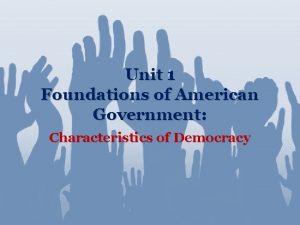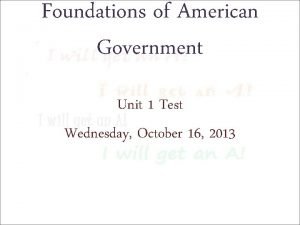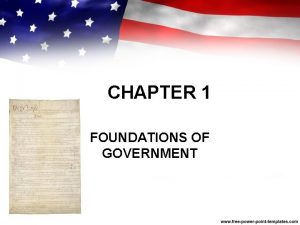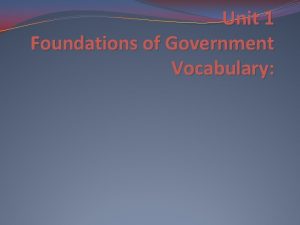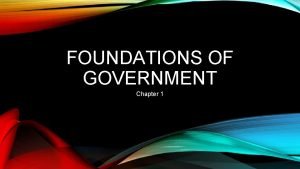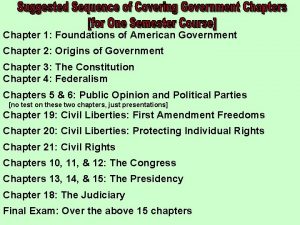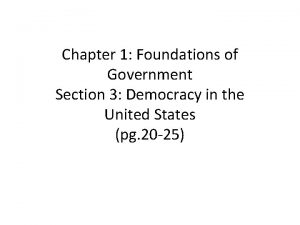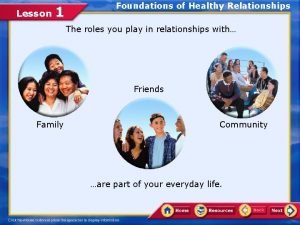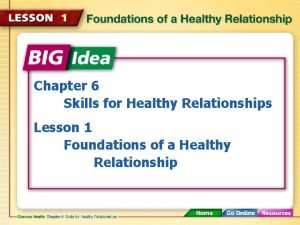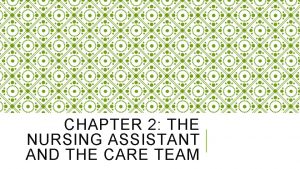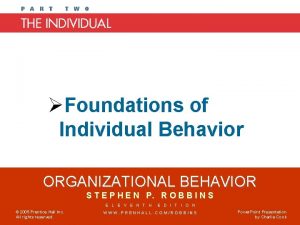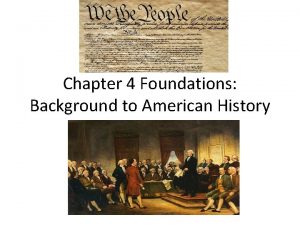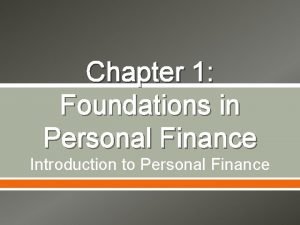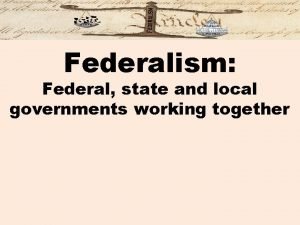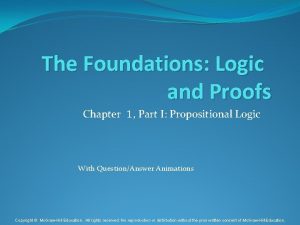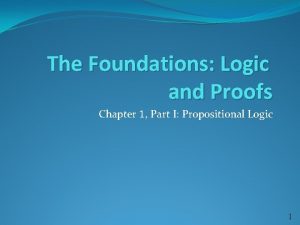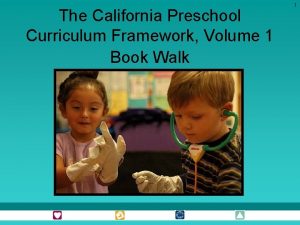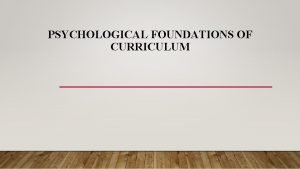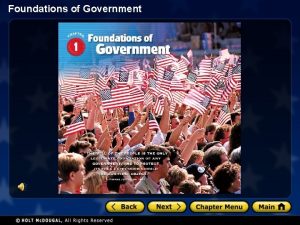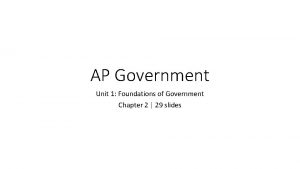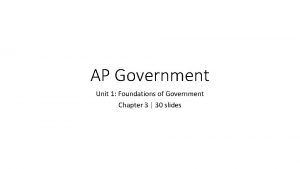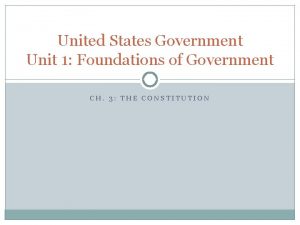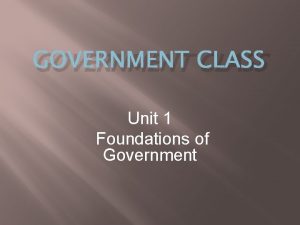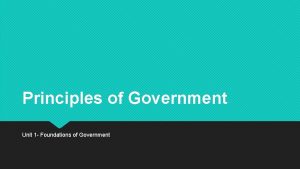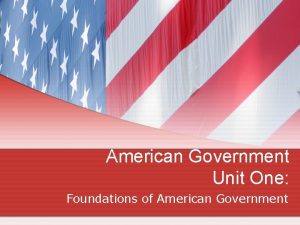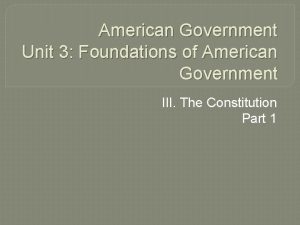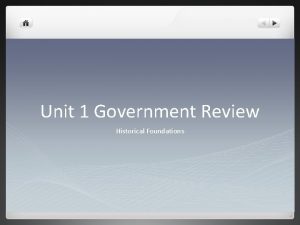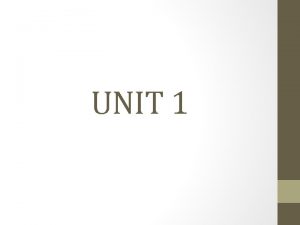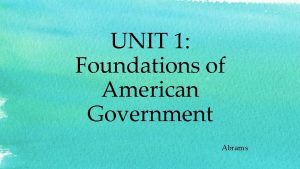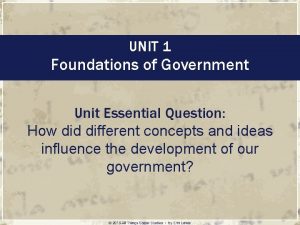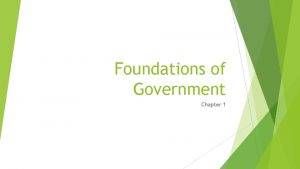AP Government Unit 1 Foundations of Government Chapter


















- Slides: 18

AP Government Unit 1: Foundations of Government Chapter 1 | 16 slides

Politics & Government • Politics: the process of resolving conflicts and deciding “who gets what, when, and how. ” • It also refers to conflicts and decisions made at the federal, state, local, and/or tribal levels regarding the selection of decision makers, the structure of institutions, and the creation of public policy. • Government: the institution in which decisions are made in order to resolve conflicts or allocate benefits/privileges. • It has the ultimate authority within its society. • An institution is an ongoing organization that performs certain functions for society.

Why is Government Necessary? • Government has four major purposes. • Maintain social order: keep conflicts within the population to a minimum. • Provide public services: provide goods/services to the population that they cannot or will not do on their own. • Provide for national defense: protect the population from internal and external threats. • Make economic decisions: present the population with economic opportunities in order to relieve scarcity.

Why is Government Necessary? • American government has also been articulate when it comes to political values. • Government has the ability to regularly reinforce political values. • “Americans may not always like government but the like they absence of government even less. ”

How Government Comes To Be • Theories on How Government Emerges: • Divine Right: a government’s legitimacy is granted directly by a higher power. • Evolution: a well-respected and/or influential family evolves into an authority. • Social Contract: people agree to have a government, giving up some of their individual liberty in order to obtain protection from the government they create. • The Divine Right theory was directly challenged during the Enlightenment. • Philosophers Thomas Hobbes and John Locke both wrote on the social contract and how it leads to government. • While their starting points were similar, their ending points were not.

Lessons from Hobbes State of Nature Why/how Create Government? Relationship between the People & Gov’t • People are naturally bad. • Life is cruel. • For protection (from each other). • Give up liberty in return for protection. • Government can do whatever it wants. • The people are to blame for the government’s actions.

Lessons from Locke State of Nature How/why create Government? Relationship between the People & Gov’t • People are naturally good and governed by reason. • People have natural rights (life, liberty, property). • For protection (of natural rights). • Give up liberty in return for protection. • Government must follow social contract. • Right to revolution.

Fundamental Values • Political culture: the set of ideas, values, and ways of thinking about government and politics that is shared by a majority of citizens. • Often created by consensus, a collective agreement. • Political socialization: the process through which beliefs are transmitted to successive generations.

America’s Fundamental Values • Liberty: the freedom of individuals. • This freedom must be consistent with the freedom of others in society. • Order and Rule of Law • Order: a state of peace and security. • Rule of Law: laws rule, and everyone obeys the rules, or in this case, the laws. • Individualism: the belief that people can and should be able to get ahead on their own. • Equality: the idea that all people are of equal worth. • Property: anything that is or may be subject to ownership.

Value Conflict • Some of these values can come in conflict with each other. • Economic inequality is usually fixed by redistributing property (money). This goes against individualism and property rights, not to mention capitalism. • Capitalism: economic type characterized by private ownership of property and wealth. • Eminent domain: the ability of the government to take private property for public use in exchange for just compensation. • Culture War: conflict between traditional and progressive values that may cause intense polarization of a population beyond typical divisions of disagreement.

Why Choose Democracy? Anarchy: the absence of government. • Types of Government • Autocracy: rule by one • • Absolute monarchy: king/queen controls all Constitutional monarchy: king/queen rules alongside a constitutional government Totalitarian dictatorship: dictator controls all Authoritarian dictatorship: dictator controls government institutions • Oligarchy: rule by small group • Aristocracy: rule by “the best” meaning the wealthy • Theocracy: religious-based government • Democracy: rule by the people • Direct: political decisions are made directly by the people • Representative: people elect representatives to make political decisions

Characteristics of Democracy • Individual Liberty • People are free to better themselves. • Majority Rule with Minority Rights • While the majority makes decisions, nothing happens to the minority and their decision-making abilities. • Free Elections • Elections are easy to participate in, and have equal and secret ballots. • Competing Political Parties • Give focus to specific issues and present voters with choice.

Democracy in Action • Direct democracy is limited by population and participation. • A republic is a form of representative democracy, wherein power still rests with the people albeit indirectly. • A democratic republic is what exists in the US. • Limited government: the idea that government is not all powerful, nor should it be, therefore it has limits.

Theories on American Democracy • Majoritarianism: the government should bend to the will of the majority in a democratic society. • Elitism: society is actually ruled/controlled by “the elite” who exercise power in their own self-interest. • Pluralism: politics is a series of conflicts between interest groups, solved only by compromise and bargaining. • Hyperpluralism: there are so many interest groups that the processes of politics and government slow to an extreme extent.

The Political Spectrum • Ideology: a comprehensive set of beliefs about something. • A political ideology is a structured set of beliefs about politics and policy. • There are two mainstream ideologies: liberal and conservative. • Liberals like change. • Conservatives can’t change. Radicalism Liberalism Conservative Reactionary

The Political Spectrum Conservative: More for tradition or wanting things to stay the same. AKA: the center-right, and in America, the Republicans. Moderate: No strong feelings one way or the other. Majority of the population. Autocracy: political and economic structures are controlled by the government, while the public interests are often overlooked. Fascism: national unity for the benefit of economics and militarization, usually operating under a dictatorship and strong gov’t…there are no public interests. The far right.

The Political Spectrum Liberal: More open to change. AKA: the center-left, and in America, the Democrats. Anarchy: the absence of government… there is no public, so there are no public interests. The far left. Socialism: a political and economic belief that allows for the government to become more involved in society, while keeping with public interest. Moderate: No strong feelings one way or the other. Majority of the population.

Notes on Your Own • Using pages 22 -32, answer the following questions to finish notes for this chapter. It will be helpful to copy down the questions. 1. Why is it difficult to define liberalism and conservatism? 2. Considering libertarianism… a) How is libertarianism different from liberalism and conservatism? b) Where would it fit on the political spectrum? Why? 3. For each category of change, describe the what is projected to happen to the US and how this could impact American politics. a) b) c) d) e) Age Ethnicity Globalization Technology Environmental
 Unit 1 foundations of american government
Unit 1 foundations of american government Foundations of american government unit 1 test review
Foundations of american government unit 1 test review Guided reading activity foundations of government lesson 1
Guided reading activity foundations of government lesson 1 Foundations of government vocabulary
Foundations of government vocabulary Chapter 1: foundations of government pdf
Chapter 1: foundations of government pdf Foundations of government (chapter 1 test form a)
Foundations of government (chapter 1 test form a) Foundations of government section 3
Foundations of government section 3 Foundations of a healthy relationship
Foundations of a healthy relationship Chapter 6 skills for healthy relationships lesson 1
Chapter 6 skills for healthy relationships lesson 1 Chapter 2 the nursing assistant and the care team
Chapter 2 the nursing assistant and the care team Foundations of individual behavior
Foundations of individual behavior Chapter 4 foundations background to american history
Chapter 4 foundations background to american history Foundation in personal finance chapter 1 answers
Foundation in personal finance chapter 1 answers Unit 6 review questions
Unit 6 review questions National government vs federal government
National government vs federal government Equivalent disjunctive form example
Equivalent disjunctive form example The foundations logic and proofs
The foundations logic and proofs Ca preschool curriculum framework
Ca preschool curriculum framework Learning is explained in terms of wholeness of the problem
Learning is explained in terms of wholeness of the problem
